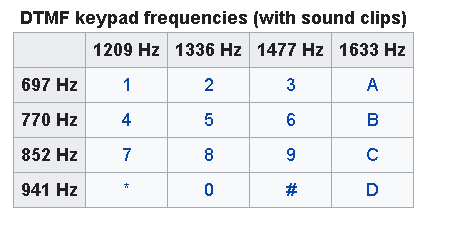Question
In Python: Build a DTMF encoder. The Wikipedia page for DTMF Signaling gives a table of the tonal frequencies. For each keypress of a telephone
In Python:
Build a DTMF encoder. The Wikipedia page for DTMF Signaling gives a table of the tonal frequencies. For each keypress of a telephone keypad, the system combines a sinusoid of row tone and a column tone and sends both. Code below should explain that in the final few lines.

Your code should take a string of arbitrary length, e.g., "123-456-7890" and encode the values that correspond to valid keys and ignore the rest. E.g., "12 34aB-cd$%^&76" should output the tones for "1234abcd76" (allow both lowercase 'b' and uppercase 'B', etc.). Make each keypress a half second long and put a tenth of a second of silence between the keypresses. Do not add a silence period at the end. Ideally, both the silence length and the keypress length should be easily settable (and resettable) parameters.
Use Fs = 8000, the standard sampling rate for telephone quality audio.
What I have as of yet: (Not even close to working, but you can modify it to make it work according to specifications above)
import numpy as np import matplotlib.pyplot as plt plt.style.use('ggplot') from IPython.display import Audio, Image import scipy.signal as sig %matplotlib inline
def __get_number(self, freqs): number = 0 keys= '1','2','3','A',\ '4','5','6','B',\ '7','8','9','C',\ '*','0','#','D' F1 = [697,770,852,941] F2 = [1209, 1336, 1477, 1633]
print ('*************************') print ('1\t2\t3\tA') print ('4\t5\t6\tB') print ('7\t8\t9\tC') print ('*\t0\t#\tD') print ('*************************')
xString = input("Enter your number: ") x = int(xString) xlist = list(str(x))
#Declaring the lengths of x N = len(xlist) Fs = 8000 t = np.linspace(0,1,Fs) hifreq = 0 lowfreq = 0 n = 0 while n DTMF keypad frequencies (with sound clips) 1209 Hz 1336 Hz 1477 Hz 1633 Hz 697 Hz 1 770 Hz 852 Hz7 941 Hz 4 0 DTMF keypad frequencies (with sound clips) 1209 Hz 1336 Hz 1477 Hz 1633 Hz 697 Hz 1 770 Hz 852 Hz7 941 Hz 4 0
Step by Step Solution
There are 3 Steps involved in it
Step: 1

Get Instant Access to Expert-Tailored Solutions
See step-by-step solutions with expert insights and AI powered tools for academic success
Step: 2

Step: 3

Ace Your Homework with AI
Get the answers you need in no time with our AI-driven, step-by-step assistance
Get Started


